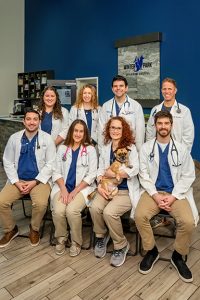Animal Instincts
 There’s a tradition at Winter Park Veterinary Hospital in which every new hire to the team is asked to read a book by Dr. Spencer Johnson titled Who Moved My Cheese? A guide to preparing for change in the workplace—and learning how to embrace it—the bestseller’s theme fits in perfectly with the philosophy of a practice that has been one of Central Florida’s leading providers of animal care for decades.
There’s a tradition at Winter Park Veterinary Hospital in which every new hire to the team is asked to read a book by Dr. Spencer Johnson titled Who Moved My Cheese? A guide to preparing for change in the workplace—and learning how to embrace it—the bestseller’s theme fits in perfectly with the philosophy of a practice that has been one of Central Florida’s leading providers of animal care for decades.
They have earned that reputation by treating thousands of beloved pets over the course of 40 years, but Winter Park Veterinary Hospital refuses to rest on its past success. In fact, the family-owned and-operated business is always on the lookout for ways to get better, whether it’s through continuing education, the use of new technology or the adoption of medical advancements.
“Employees know from their first day that we’re constantly trying to tweak things to find a better way,” says Billy Hess, practice manager and the son of owner Robert Hess, DVM. “One of our core values is change. We’ve embraced that as a fundamental tenet of our hospital culture. Everybody knows that we’re always looking to do something different; not just chasing shiny objects but doing things that are strategic and fit within our core values and that are going to make things better for our clients and our patients.”
Technology, of course, plays a major role in all medicine today, and Winter Park Vet is proud to be one of the only offices of its kind in Central Florida offering a CT (computed tomography) machine, which provides advanced diagnostic imaging capabilities and is especially useful in dental procedures. The practice also utilizes laser therapy—common in college and professional sports, Hess points out—which promotes recovery after surgery and can also help reduce pain and inflammation in arthritic dogs.
Advanced surgery options, such as a canine knee stabilization procedure that is cost-effective and achieves better results than traditional, non-specialist knee surgeries, are also part of the approach. It’s no wonder that Winter Park Vet gets many referrals from other veterinarians or requests for second opinions.
“Some owners either can’t get into a specialist or don’t necessarily want to go that route because specialty medicine is so expensive,” Hess says. “Having a large team and a medical director who makes sure we’re on the forefront of general practice medicine enables us to have a lot of different perspectives working on a case and makes sure that we have the resources to provide the type of medicine to solve those complicated cases.”
Often, the practice welcomes in pet parents who have tried multiple vets and are afraid they’re never going to find a solution to their animals’ issues. “We’ve worked really hard over the past two years to be a haven for people who didn’t have a place to go,” Hess says.
That has been the mantra of the practice ever since Dr. Hess assumed ownership in 1983, two years after joining the team as a veterinarian. He and his wife Jean steadily built the practice over the years, and their son developed the same love for animals as his parents.
“I grew up seeing patients come home with Dad, working in the kennel, helping out on hurricane duty and spending summers at the practice,” he says. “It’s been quite a journey.”
Throughout the Hess’ tenure, Winter Park Vet has remained a family practice, even while many other veterinary offices in the region have been taken over by massive corporate groups. Those practices may retain their original name and local branding to deceive clients, but in fact their money is going to hidden private equity groups.
“That structure is fundamentally a different value system and a lot of people aren’t really aware of it,” Hess says. As a locally owned and operated practice, “Clients’ money stays in the community here, and there it’s going out to wherever their investors are. I think that’s significant and I think it matters.”
Winter Park Vet has long been recognized as one of the leaders in exotic pet care in Central Florida, and it is the main veterinarian for the Audubon Center for Birds of Prey, treating eagles, owls and other birds. The team also encourages residents who find injured animals like turtles or possums to bring them to the office, where the staff will help get them to a rehabilitation facility so they can be returned to the wild. Winter Park similarly tends to animals after hurricanes, and Hess remembers one occasion when over 100 baby squirrels were being fed in the office after a storm.
The team is very community-minded as well, sponsoring a yearly internship at Audubon, setting up a scholarship to the University of Florida and working with the Boys & Girls Club to give tours to students and possibly get them interested in veterinary careers.
Clearly, the practice is always seeking to help in as many ways as possible, and that is one thing that will never change about Winter Park Vet, from the Hess family down to every last member of the staff.
“Our leadership team has been with us for decades and they help to make the daily decisions to provide care for our patients and our pet parents,” Hess says. “That’s the driving force behind the decisions that we make. It’s not a corporate agenda or anything along those lines. Pet parents need to do their research before figuring out where to take their pet.”
Winter Park Veterinary Hospital
1601 Lee Road | Winter Park
(407) 644-2676







